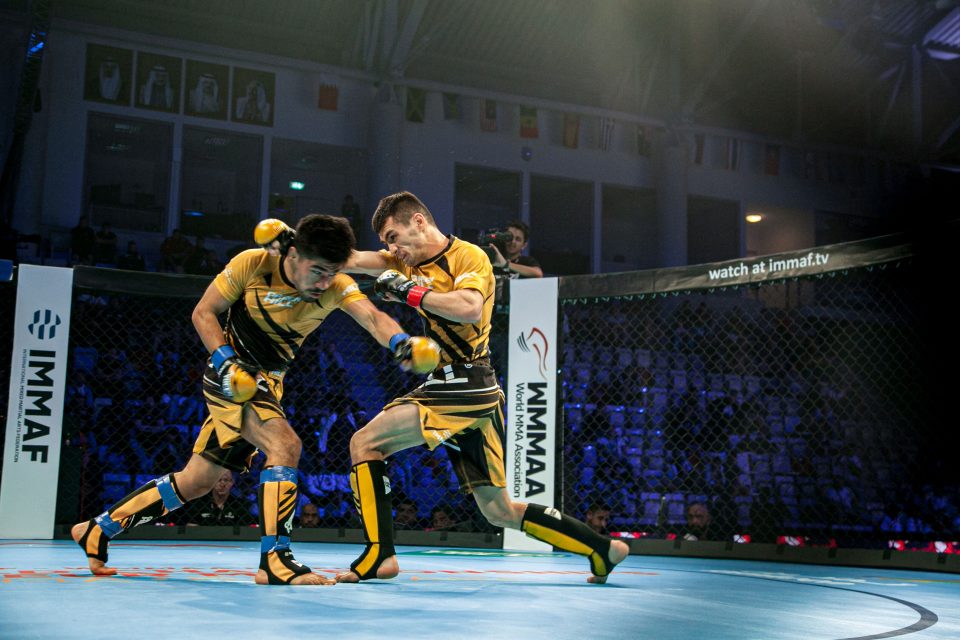The 2019 IMMAF World Championships were no exception and once again served as leading example for the world governing body’s dedication to athlete safety.
While each registered athlete is subject to medical pre-clearance prior to the championships start, including bloodwork and examinations that see IMMAF’s medical team network with doctors on a worldwide scale, the focus placed on athletes does not stop there.
Spanning 50 national teams, a total of 436 athletes were in action at the 2019 IMMAF World Championships. IMMAF’s third-party medical consultancy and non-profit services provider, Safe MMA, provided a breakdown of processes that continued to uphold elite standards of the most extensive medical policy in MMA.
“Dr Aljulanda Almaskari hand picked his team,” Safe MMA records manager Yoni Gottlieb explained. “Working closely with them, he ensured that they first understood the sport, after which most fell in love with it! It was a source of pride to him that many of them practice martial arts, with a few even being decorated national and international champions in BJJ, boxing and MMA.
“Through regular training sessions and active participation in events, Dr Almaskari ensured the bar was raised in delivering excellent medical care to athletes competing in one of the most physically demanding sports. The principle codes of conduct he set down were:
– Every athlete is a fighter, a superstar, and someone special. They have families, they fight for their countries and beliefs, and most importantly they are “our patients”.
– NO ATHLETE IS LEFT BEHIND, not in the accommodation, not in the arena or in the training ground.
– Every incident should be accounted for and every episode should be seen through to conclusion.
– Do the best possible; if it’s beyond your limit, seek help and advice.
– Keep your conduct professional.
– Keep everyone at the same distance: “my personal approach is instead of keeping everyone at an arm’s length away, embrace everyone.”
– SMILE, HIGH FIVE, FIST BUMP… HUGS are welcome after consent!
The phenomenal medical team led by Dr Aljulanda Almaskari comprised of:
– 25 doctors from the following specialties
- Orthopaedics and Trauma
- intensive care / anesthesia
- General Surgery
- Plastic and reconstructive surgery
- Emergency medicine
- ENT
- Ophthalmology
- Neurosurgery
- Internal and Acute medicine
- Obstetrics & Gynecology
- Dentistry and Maxillofacial surgery
– 12 Nurses
– 20 Paramedics
– 6 ambulance drivers
– 20 medical volunteers
– 3 secretaries (maintaining records and tracking sheets)
The extensive medical facilities covering the event were:
– Bahrain Defence Force Hospital
- Tertiary care hospital with acute trauma care and neurosurgical care
- 24/7 emergency services
– Salmaniya Medical Complex
- Tertiary care hospital with acute emergency, trauma care and neurosurgical care
- 24/7 services
– Yousif Engineer Health center
- Primary health center with radiology services
- 200m from Sports arena
medical care areas were set up within 2 sites:
Venue:
- – Medical center at the competition venue
- – Fully equipped for care of minor injuries and for athlete screening and primary care
- – Resuscitation and emergency intervention set up
- – Readily available for all athletes, teams and staff as well as audience/fans
Athlete hotel:
- – 24 hour coverage provided by a doctor and a nurse
- – Resuscitation and emergency intervention equipment
- – Primary care and medications
- – Readily available for all athletes, medical teams and IMMAF staff as well as host federation
From approximately 388 bouts, there were a total of:
– 18 brain CT scans, all normal results.
– 7 facial CT scans, 1 of which was normal and 6 of which detected a total of 4 nasal fractures and 3 orbital fractures.
– 18 X-rays, 15 of which were normal and 3 of which detected metatarsal/metacarpal bone fractures.
– Beyond these 9 athletes with fractures, there were 42 athletes with minor injuries recorded, ranging from exhaustion to lacerations.
By IMMAF.org lead writer: Jorden Curran

